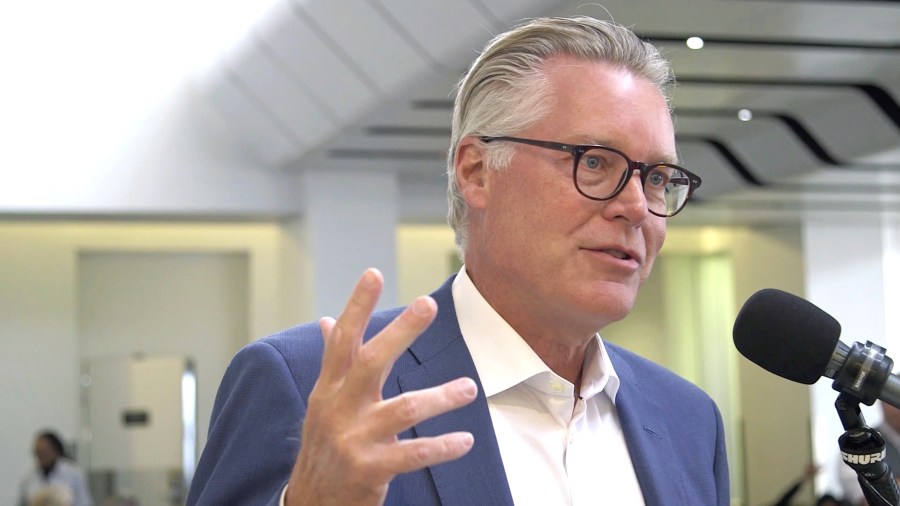Delta CEO Ed Bastian on why he’s spending big on airports

Ed Bastian last talked with Marketplace in 2016, when he’d just gotten the top job at Delta Air Lines.
That was a turbulent time that had the CEO focused on growth. This year, Delta has reported record revenue, more than $10 billion in the first quarter of 2019. When we caught up with Bastian in Los Angeles last month, he was focused on putting some of that money back into remodeling airports. Here’s an edited selection from our conversation, which you can hear in full on the “Corner Office” podcast.
Kai Ryssdal: First of all, where we are. Tell me where we are.
Ed Bastian: We are here in terminals 2 and 3 at the new LAX that we are building. Got an opportunity to almost double the size of our footprint here in LA once we get done over the next several years.
Ryssdal: Why do you need more footprint? I mean, that’s going to sound like a basic question, but …
Bastian: Well, first of all, our infrastructure as we all know, our airports in the U.S. need a multigenerational bill. Improved security flows and improve technology. And on top of that, Delta’s growing here. We’ve got a great group of people here. Our operations have doubled over the last five years, and we need more room.
Ryssdal: Do you think commercial aviation the way we’re doing it today is sustainable? Not in the climate sense, right? I mean, yes, there are emissions and jets and all that, but in the sheer business model sense, because you got crowds, you’ve got infrastructure problems, you’ve got security problems. Can we keep doing this this way?
Bastian: Absolutely.
Ryssdal: No. Come on.
Bastian: I think when you think about the reason why people are traveling, is that they’re more adventurous, they will explore the internet, social media. Our society now has more awareness of what’s going on around them than any time in our past. Technology has also brought the cost of travel down, and every year it continues to get cheaper, so we’re building bigger airplanes, we’re building bigger airports because people want to go.
Ryssdal: I talk to a lot of CEOs. I don’t quote a lot of CEOs, but one that I do trot out pretty frequently is a line you gave me in 2016 when we met in Atlanta.
Bastian: Right.
Ryssdal: Any company that’s not growing is in slow motion liquidation. First of all, do you still believe it?
Bastian: I still believe it. I say you have to grow. You’ve got to take scale you’ve got to provide new opportunities for your people and your customers.
Ryssdal: Talk to me about global travel for a second. I was in Europe not too long ago. You see Delta planes all over the place over there. Asia though is where a lot of the global growth is in aviation. How much do you concentrate on Asia and that side of the market?
Bastian: We’re less concentrated on Asia than here closer to home. So the U.S. and Europe are probably 80% of our revenue base. Asia is a long way away. And so, it’s more difficult to fly to, it’s more expensive. There’s a lot of competition that’s owned by government sources so that the government- infused support going into some of the Asian airlines make it a little more difficult for an American company to compete. But that said, we’re present. We’ve got a hub in Seoul, in Korea. We’ve got a large operation we’ve historically had with Tokyo. And we’ve got a partner in China with China Eastern with hubs in both Shanghai and in Beijing. So, you know, you think about the world population, that’s the part of the world that needs to grow quicker than anyone. India is another place that we’re launching direct service to by the end of this year. We today don’t fly direct to India.
Ryssdal: You mentioned partners. So, I will I’ll bring this up. And I’ll note that you’re not a Boeing 737 Max customer —
Bastian: We’re not.
Ryssdal: But you do fly Boeing aircraft.
Bastian: We do.
Ryssdal: Dennis Muilenburg, as you know, is having a tough time now, trying to figure all that out and what to do about that. First of all, has he called you? Have you guys spoken?
Bastian: I know Dennis well. I sent him a note of encouragement a few weeks ago and told me to stick in there.
Ryssdal: Any concerns about Boeing as a partner for Delta Air Lines?
Bastian: I don’t. Boeing is a great company, and it’s a great American company. We fly more Boeing planes than any other manufacturer. We’ve always flown more Boeing, and we hope to fly more Boeing going forward.
Ryssdal: With Delta doing so well, I’m sure you’ve seen the stories in the paper the last couple of days about corporate taxes and how much tax companies are paying. Delta is not paying a lot. Is that right, do you think?
Bastian: Absolutely. We’re following the tax code. Delta, as you recall, lost a lot of money. We lost almost $20 billion post-9/11. We went through some very difficult economies over the last 20 years. And so, what we’re doing is we’re able to offset the losses of those years against the profits of today. We have probably only have about another year or so left in those losses, and then at that point then we should start being a cash taxpayer once again. But, you know, these are hard-earned losses, I would say, that we utilize, and our people had real pain attached to them. I am proud that we’ve got the best profit-sharing plan in corporate America for our employees. They get 15% of the profits of the company; $1.3 billion we paid last year, so yeah, I think we’re doing our share.
Ryssdal: So look, how much trouble are you in? One point three billion dollars back to employees looks great, and I appreciate that. How much trouble are you in though in those coming years when you’re not going to be able to share $1.3 billion. It’s going to be 200 million or 6 million.
Bastian: Well, I think we’re going to continue to grow over a billion dollars. We’ve been over a billion dollars five years in a row. So there is there is a resiliency. You know, we’re a story that people don’t pay enough attention to. They throw the airlines into a basket, and they think that they’re just a hot mess at times, right? They have some good boom/bust cycles. We’re breaking that cycle. We’re creating a new trend for the industry, and I see no reason why we should stop that.
Ryssdal: This is an incredibly competitive business. And last time we spoke you were leaning into the competition part. You were like “I want to grow. I want to be No.1. I want to do better than anybody else.” Do you still feel that way?
Bastian: Absolutely. You know, we’re an industry that’s geared towards growth. It’s high-capital business. Get a lot invested in this. We’ve got 80,000 employees. We’ve got a very experienced workforce. And that opportunity to grow and explore is fundamental to our ability to gain better leverage on our scale. So yes, I think growth is really at the core of what it takes to be a great a company in the airline space but also as a fairly capital-intensive business as well.
Ryssdal spoke with Bastian on April 30. Since that interview, Delta has faced some criticism for its approach to its workers organizing a union effort. We reached out to Delta for a response, and it sent this statement:
“The direct relationship we have with our employees is at the very core of our strong culture and it has enabled continuous investments in Delta people. Our employees have the best total compensation in the industry, including the most lucrative profit sharing program in the world. They want and deserve the facts and we respect our employees’ right to decide if a union is right for them. Delta has shared many communications, which on the whole make clear that deciding whether or not to unionize should not be taken lightly.”
Delta














